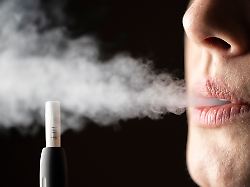Without smoke, but with tobacco
Cigarette companies are pouring billions into sticks
September 13, 2023, 9:41 a.m
Listen to article
This audio version was artificially generated. More info | Send feedback
“Have you ever got a light?” – the question used to be heard often, whether in bars or clubs. This stopped with the smoking ban that was gradually introduced in 2007. Today people mostly smoke outdoors. In the future, the desire for fire could become even rarer.
The tobacco industry is increasingly relying on alternative products to classic cigarettes in order to continue doing profitable business in the future. Tobacco heaters into which sticks are inserted play a major role here: after Philip Morris and British American Tobacco (BAT) brought such products onto the market a few years ago, Japan Tobacco International (JTI) wants to become the third international company in 2024 bring a tobacco heater onto the German market.
The three industry giants have high expectations for future sales. However, health experts view the development with worry lines. At the Dortmund Intertabac trade fair, which begins on Thursday and is considered the world’s largest industry gathering, the tobacco heaters will be extensively advertised again until the trade fair closes on Saturday.
The industry giants have earned well for decades with classic fags, whether Marlboro (Philip Morris), Dunhill (BAT) or Winston (JTI). But cigarette sales have been declining for years. The non-flammable products are now a way for the companies to save the ailing tobacco business model in the future. A lot of money was invested in this.
Since 2008, Philip Morris alone says it has spent 10.5 billion US dollars (9.8 billion euros) on research and development of so-called reduced-pollutant products, which include tobacco heaters from the Iqos brand. BAT spends around £350 million (€407 million) a year on what the company calls “reduced risk products”, including e-cigarettes and nicotine pouches that you place under your upper lip.
Even the industry does not deny the dangers
BAT’s tobacco heater brand is called glo, JTI’s is called Ploom. With these products, tobacco is only heated and not burned. This means fewer pollutants are released. It is still bad for your health. Exactly how extensive the damage is is still unclear due to the lack of long-term studies. “Tobacco heaters are addictive lifestyle products with a health risk,” warns Katrin Schaller from the German Cancer Research Center. “The aerosol from tobacco heaters contains harmful substances that are inhaled deep into the lungs when used.”
Addiction researcher Daniel Kotz from the Heinrich Heine University in Düsseldorf is also concerned about the products. “Tobacco heaters contain tobacco like traditional cigarettes,” he says. There is a possibility that consumers will use the heated sticks in the long term and thereby put their health at risk. “There are proven effective and safe ways to quit tobacco smoking, such as using nicotine replacement products such as chewing gum and sprays.”
The tobacco industry does not deny the dangers either. “These products are addictive and are not risk-free,” BAT says in a footnote. Both companies emphasize that they only target smokers for whom switching to tobacco heaters would be a better alternative. In order to access the Iqos website, you must confirm that you are of legal age and use nicotine or tobacco products. But that is not a real barrier. Because if you cheat a little and say you’re a smoker, you’ll end up on the glossy advertising page.
Still a losing proposition for BAT
The business with tobacco heaters and their sticks is still a niche, but it is getting bigger and bigger. Their share of the overall tobacco market in Germany is around four percent, one percentage point higher than in 2021, says Jan Mücke, general manager of the Federal Association of the Tobacco Industry and Novel Products (BVTE). “The market grows by around half a percentage point every year – the growth will continue.” The industry representative sees the products as an important offer for smokers if they want to stop smoking. “Many people want to absorb nicotine and taste tobacco – so it’s a good thing if they do that with risk-reduced products.” The “nicotine rush” is similar to that of a cigarette, says Mücke. Switching to tobacco heaters is therefore easier for heavy smokers.
Mücke was formerly for the FDP in the Bundestag and State Secretary in the Federal Ministry of Transport. He is not the only ex-politician promoting the tobacco industry in Berlin: Philip Morris recently hired the former Prime Minister of Schleswig-Holstein, Torsten Albig, as its top lobbyist for Germany. “As a company, we have set ourselves the goal of a smoke-free future in which cigarettes are to be replaced by products with reduced pollutants,” says the SPD politician. “Anyone who smokes should stop as quickly as possible – and those who don’t quit should switch to alternative products with reduced pollutants.”
Philip Morris’ “smoke-free products”, which in other countries also include e-cigarettes and nicotine pouches, recently accounted for a good third of group sales, and by 2025 this share is expected to be 50 percent. 27.2 million people worldwide are currently using Iqos, and by 2025 the number is expected to be 40 million. BAT wants to increase the number of users of the group’s non-flammable products from 24 million worldwide at the end of 2022 to 50 million in 2030. So far it has been a loss-making business, but by 2024 we want to be profitable, i.e. make a profit. That would be a year earlier than planned, says a BAT spokeswoman. Philip Morris leaves the question unanswered as to whether the Iqos business is still in the red.
